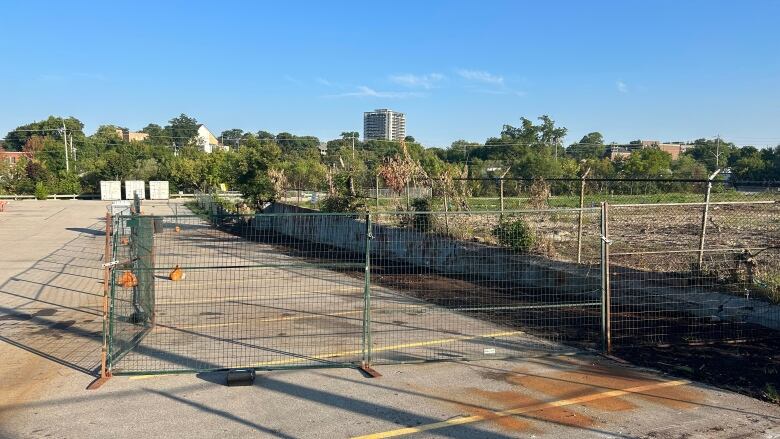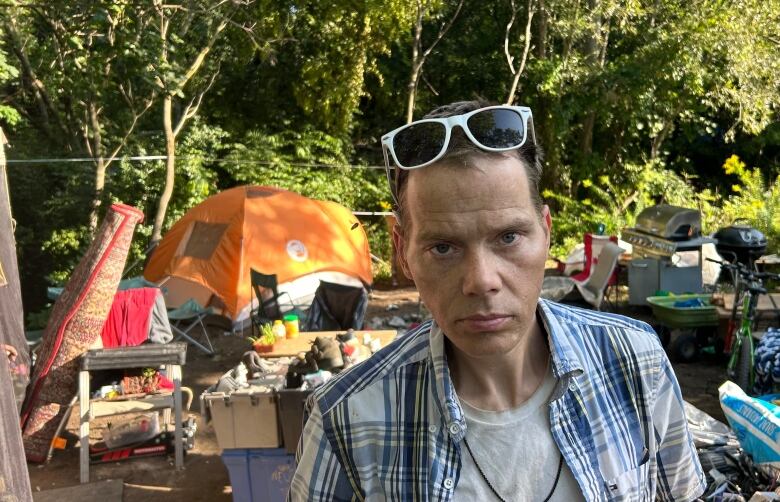Concerns over outreach arise after Cambridge encampment cleared out
'If people scatter and camp, it becomes much more difficult,' says social worker

An encampment at 150 Main St. in Cambridge officially closed last week, but with its closure comes new concerns over outreach service delivery.
"They gave us pretty much a couple days and said we want you gone by this date," said Kevin Boutilier, who formerly lived at the encampment. "And then immediately after they bulldozed the whole area down."
Cambridge's encampment was officially shut down on Aug. 24, after the remaining two residents on the premises agreed to the region's proposal to move them.
Boutilier only recently became homeless, spending most of that time in the encampment a large, empty parking lotbehind 150 Main St.
Even with a full-time job in an upscale local restaurant, he said the cost of living became too much for him.
"Rent got too high and I couldn't keep up," said Boutilier.
Boutilier, along with some others who were kicked off the lot, carried his tent and belongings further down the street to a wooded area, near Soper Park in Cambridge.
He said their options were very limited.

"Either be here or up in the woods somewhere else. Or outside of town."
Chris Barber, another man residing in the wooded area of Soper Park, said this new and growing encampment rivals the size of the one at 150 Main St.
"It's just as many people as there was at 150 Main, if not more," Barber said.
Region offered transitional housing and shelter beds
In order to get the encampment residents to move, officials with the regionsaid they offered alternative housing options, which included transitional housing and shelter beds. Oftentimes, residents would have to be given an offer multiple times before saying yes, said Peter Sweeney, Waterloo region's commissioner of community services.
"We occasionally use motels to support people on a very short-term basis if we need to," Sweeney said. "We have the new hybrid shelter on Erbs Road as an available option and then obviously, permanent housing that we're trying to support."
"I also know that some people left on their own accord. And itwould be naive of me to suggest that there weren't still people choosing to live outside."
Sweeney said police and fire departments were on site for the closure. The fences were closed up and belongings cleared.
Issues with safety
The encampment was a safety issue, he said. Not only for those living adjacent to it, but for those living inside of it as well.
"There were multiple incidences of very violent, aggressive behaviour between residents. You know, the number of police calls that were made was very significant."
Concerns over fire safety, sanitary problems and the safety of the staff inside the building at 150 Main St. were among the concerns Sweeney brought up.
The encampment was the focus of a community safety town hall back in July, organized by Cambridge Mayor Jan Liggett.
Although the encampment was unsafe, Sweeney said that it did make it easier for outreach organizations to provide their services.
"It doesn't hold that because it's a little bit easier to support folks on one level, that we should be OK with very large, sometimes unmanageable, and often unsafe environments."
Pete McKechnie is the social support coordinator for SanguenHealth Centre, a not-for-profit community-based health care agency. They have a mobile health bus that would stop off at the encampment every Tuesday.
"It is literally a physician's office on wheels," he said.
McKechnie echoed Sweeney in saying the closing of the encampment is going to make outreach services more difficult to provide.
"I think if you ask anybody that, they'll respond that way," he said. "We knew where to find folks who we're doing follow-up care for medical, as well as social support, housing, shelter, all those things."
'We knew where people were'
As a social worker, McKechnie played a role in helping encampment residents find housing. Decentralizing the populationat 150 Main St. has also made notifying successful candidates that their housing option is available more difficulttoo.
"We knew where people were. If people scatter and camp, it becomes much more difficult."
McKechnie said that the services they provide require a "great deal of trust."
"It takes a lot of relationship building as a worker, as a healthcare provider, for an individual who's homeless to trust healthcare and the harm reduction that we provide."
McKechnie said that he heard of people, like Kevin Boutilier, who had moved from the encampment to the wooded area by Soper Park. His team has already visited the new site to formulate outreach plans.
Sanguen's mobile health bus makes stops at Cambridge Vineyard Christian Fellowship on Elgin Street North, just up the street from Soper Park. McKechnie also said the bus will continue to make stops at 150 Main St., the site of the closed encampment.
"Anybody who's unsheltered and homeless within Cambridge, no matter where they are, we will work with them 100 per cent, and we will do our best to go to them."












_(720p).jpg)


 OFFICIAL HD MUSIC VIDEO.jpg)
.jpg)



























































































